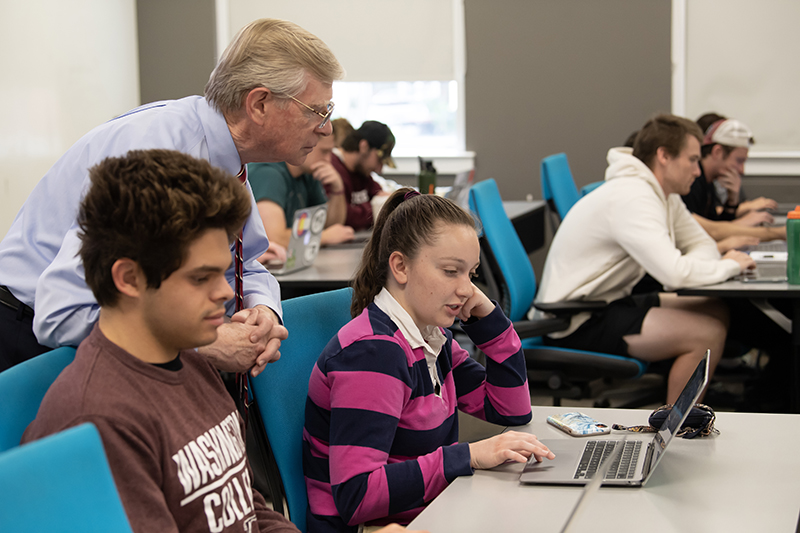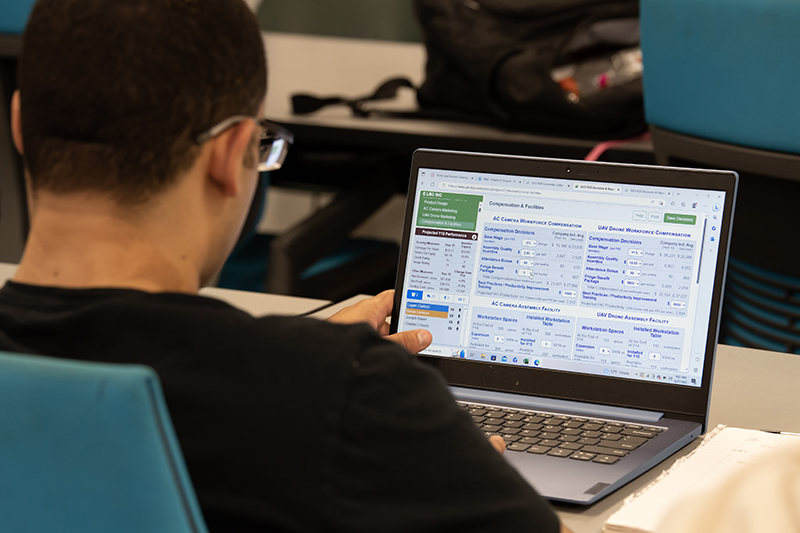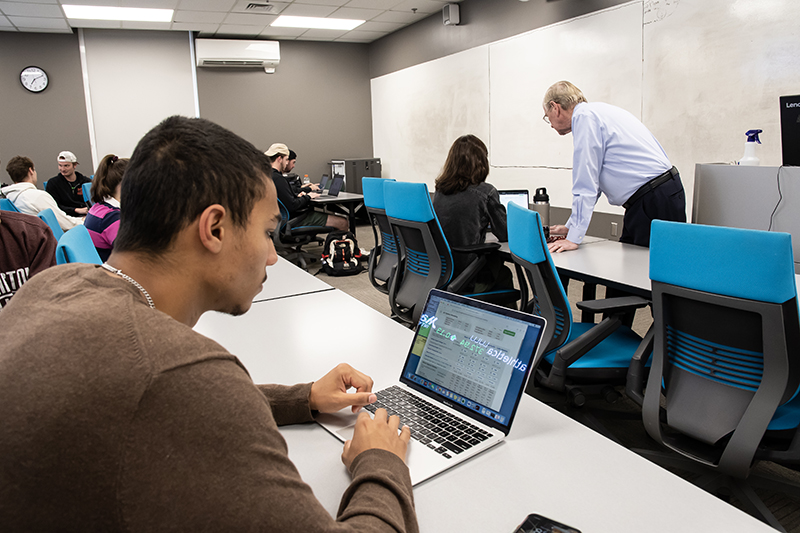Students Succeeding in Global Business Simulation
Students in Business 311: Global Business Strategy have been among the top competitors in a semester-long business simulation used by students in 1,215 undergraduate classes in 12 countries around the world.

Professor Joe Bauer looks at the screen showing business simulation choices by Alex May '23, as Grayson Wright '25 explores other options for the business.Success at running a business doesn't get measured in grades. The performance of executives is evaluated through how their business competes in its industry. What is its market share, its profits, its return to investors?
Students in Business 311: Global Business Strategy got their first opportunity to experience that kind of competition through a semester-long business simulation on a software platform called GLO-BUS that is used by students in 1,215 undergraduate classes in 12 countries around the world. The Washington College class has been near the top in every measured category compared to those other schools all semester.
The Washington class is divided into seven teams, called companies in the program, comprising three students each. The students make weekly adjustments to nearly every aspect of their simulated business, which sells cameras and unmanned aerial vehicles (UAVs), usually called drones. The program counts each week as a year in business, and the students' choices lead to varied outcomes.
Students change everything from product design to personnel decisions, from marketing to reinvesting in their company, such as by taking loans to automate production. The GLO-BUS software then converts those decisions into the metrics on which they are measured, such as earnings per share, return on equity, stock price, credit rating, and image rating.
“We have been trying multiple strategies,” Issela Rios '23 said. “It's a lot of fun because it is like figuring out a puzzle.”
Rios and her fellow students spend a lot of time adjusting possible variables each week, both in and outside of the classroom, then must commit as teams by the end of the day every Thursday.
Visiting Assistant Professor of Business Management Joseph Bauer, who has been teaching the course using this approach for five years, encourages that experimentation and refers to his role in the class a “roving consultant.” He starts many class periods with a short presentation on an aspect of running a company, but then he steps back and allows the students to get to work.
“I tell the students to go to the extremes [on choices like product quality or warranty terms] but then start to ratchet back to find the sweet spot, the greatest quality at the lowest cost on an ongoing basis,” Bauer said. “This is as close as I could get us to real life and all of the details that go into it.”
Bauer emphasizes striving for as much of a real-world experience as possible in his courses, and it is the aspect of this class that students highlight as making the work fun, challenging, and worthwhile.
“This is what I'm working towards. I want to be able to do stuff like this in a real
setting,” business management major Charles Crouch '23 said. “Right now we're offering
a higher quality product than the competition and also offering sales promotions and
a longer warranty. The team is pumping a lot of money into advertising, and the idea
behind that in my perspective is if we're all you see, that's what you're going to
go for.”
 Charles Crouch '23 adjusts his inputs for the business simulation.With unabashed enthusiasm, Bauer calls Crouch the class “Wall Street guy” who is itching
to not only beat out the other undergraduate classes, but also take on the students
using the program in business schools and executive MBA programs.
Charles Crouch '23 adjusts his inputs for the business simulation.With unabashed enthusiasm, Bauer calls Crouch the class “Wall Street guy” who is itching
to not only beat out the other undergraduate classes, but also take on the students
using the program in business schools and executive MBA programs.
While Crouch is using the class to synthesize the concepts he has learned in his time at Washington, other students are discovering how compelling management can be through their experience in the class.
Grayson Wright '25 is a business management major with minors in accounting, entrepreneurship, and economics, but he is still discovering how broad the field is. Global Business Strategy surprised him, and he is enjoying its dynamic nature.
“After taking this course, I have a better idea of what I want to do in my career,” Wright said. “It really teaches you a lot about running a business and making decisions in a global market."
While the competitive business simulation forms the backbone of the course and Bauer is quick to give credit to the students for their performance, he also brings an essential element to the class in the form of real-world experience.
Bauer began teaching at Washington just over a decade ago, following an early retirement from a career at Perdue and Tastykake. He found that the perfect world depicted in textbooks and classrooms only provides the foundation for success in the real world. He focuses on preparing his students with the skills to adjust to new conditions, unexpected challenges, and unique agendas. The global business simulation and his goals as a professor dovetail in their emphasis on pushing students to combine what they've learned with the unpredictable nature of competition and other people.
“Because of my background, I think I have an advantage in mapping the text to reality,” Bauer said. “It allows me to say to the students, ‘This is what happens when you're dealing with people in the real world.'”
 Students in BUS311—Global Business Strategy consider their options in a simulation
competing with classes around the world.
Students in BUS311—Global Business Strategy consider their options in a simulation
competing with classes around the world.